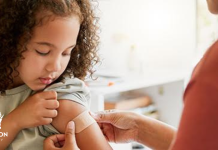Written by Angela Bray and Jenna Romanowski, Public Health Educators.

The holiday season is here and is usually filled with cheer, goodwill, and family gatherings. While holiday get-togethers with family are fun, it’s also virus season. Don’t let respiratory viruses like Respiratory Syncytial Virus (RSV), COVID-19, and the flu, or stomach viruses such as norovirus put a damper on your holiday celebrations. Protect yourself and your loved ones from respiratory illnesses and practice food safety to safely celebrate and enjoy the holidays.
RSV
RSV is a large cause of respiratory illness in all age groups, and especially affects infants, young children, and older adults. These age groups can get serious complications if they get sick with RSV. Among infants and young children, it is the most common cause of bronchitis, croup, ear infections, and pneumonia. Respiratory illnesses are usually spread from person to person when an infected person breathes, speaks, sings, coughs, or sneezes. Respiratory viruses can also spread by having direct contact with an infected person or by touching an infected surface and then touching your mouth, nose, or eyes. There is no specific treatment for RSV and most people recover on their own. This year, there are new RSV immunizations available for certain groups of people.
Infants and young children: Monoclonal antibody products, which are not vaccines but are given by injection, are approved by the CDC (Centers for Disease Control and Prevention) and are available to protect infants and young children from severe RSV.
Older adults aged 60 or older: Vaccines are approved by the CDC and currently available to protect older adults from severe RSV.
Pregnant people: Pregnant people can receive an immunization approved by the CDC to protect their newborn(s) against severe RSV and hospitalization.
RSV immunizations are a great way to protect those who are most at risk of severe RSV. In addition, COVID-19 and flu vaccines are also a great way to protect yourself and those you love from severe disease. The CDC recommends that everyone 6 months and older receive an updated COVID-19 vaccine and flu vaccine. These vaccines can help us all gather safely during the holidays. Find where vaccines are available near you at Vaccines.gov.
Norovirus
Norovirus, often called the “stomach flu,” is the leading cause of vomiting and diarrhea the in the United States. Other symptoms include fever, chills, aches, and tiredness. It spreads quickly and easily by:
- Having direct contact with someone with norovirus.
- Eating or drinking food or water contaminated with norovirus.
- Touching surfaces or objects contaminated with norovirus and then touching their mouth without washing their hands.
Most people will get better within one to three days. However, call your doctor for signs of dehydration such as decrease in urination, dry mouth and throat, and feeling dizzy when standing up.
Tips to safely gather with family during the holidays
Get vaccinated now. Make an appointment to get vaccinated now for flu, COVID-19, and RSV (if eligible) so your body has time to build immunity. These vaccines help protect all of us from severe respiratory diseases or can make our symptoms less severe if we do get sick. The COVID-19 and flu vaccines are safe and can be received at the same time. Most health insurance companies completely cover the cost of vaccines. For families without insurance, the Vaccines For Children (VFC) offers vaccines at no cost to children who might not otherwise be vaccinated because of inability to pay.
-
- Practice good hygiene. Wash your hands for at least 20 seconds and cover your mouth and nose when coughing or sneezing. Avoid touching your face (especially mouth, nose, and eyes).
- Avoid close contact with sick people and disinfect objects and surfaces regularly (like doorknobs, countertops, and light switches).
Stay home when sick. Get tested if you have symptoms of COVID-19.
Practice good food safety/hygiene.
-
- Keep raw meat, poultry, seafood, and eggs separate from all other foods. Store these foods in separate areas in the fridge and use separate cutting boards.
- Use a food thermometer to make sure food is cooked to a safe temperature to kill any germs that can make you sick.
- Wash your hands before, during, and after preparing food. Also wash utensils and surfaces after every use.
- Refrigerate leftovers within two hours. Food should be kept out of the temperature “danger zone” (40-140°F).
If you feel sick or have any symptoms of illness, it is important to stay home and away from others. See a provider if you have severe symptoms of a respiratory virus or norovirus or would like more information about RSV, COVID-19, or flu vaccination. From us at DHS, we wish you a happy and healthy holiday season!
















